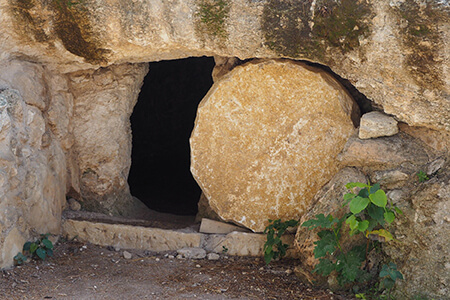 Acts 10:34A, 37-43
Acts 10:34A, 37-43
 Colossians 3:1-4
Colossians 3:1-4
 John 20:1-9
John 20:1-9
In 1980, some ossuaries were discovered in the neighborhood of Jerusalem with inscriptions bearing the same name of some people from the New Testament. Among them were Jesus son of Joseph, Mary and Jose (short for Joseph). This leads to the claim that these ossuaries were from Jesus' family tomb. In March 2007, a documentary (The Lost Tomb of Jesus) was broadcast and a book (The Jesus Family Tomb) was also released. Needless to say, many Christians were upset by the claim. Not only does it contradict the belief of the resurrection and the ascension of Jesus as well as the assumption of the Blessed Virgin Mary; it directly challenges the core of the Christian faith.
Yet despite this controversy, today, the world still celebrates Easter Sunday, commemorating the resurrection of Jesus. Though Jesus does not appear in today's Gospel episode, and that there is no ocular proof of Him actually risen, we have eye witnesses who gave detailed descriptions of what they saw at that moment when they went into the empty tomb. They saw the “linen cloths lying there, and the handkerchief which had been about his head, not lying with the linen cloths, but folded in a place by itself” (Jn 20:6-7). Later, in his post Pentecostal sermon, Peter together with the other apostles, crowned themselves as witnesses of Jesus' resurrection (rf Acts 2:31-32).
Perhaps true witnessing is not what the apostles report but how they act, and the drastic change they exhibit. From denying and abandoning Jesus earlier and hiding themselves in the upper room, they now fearlessly and openly siding with Jesus, the “crucified criminal”, and proclaim His death and resurrection despite many ridicules, hardships and persecutions (rf Acts 3:12-15, 5:30-32, 10:39-42). Should we doubt and accuse Peter and John, together with the other apostles, of fraud and cover-up? Should we believe that they knew Jesus did not rise bodily from the dead and they fabricated a fraudulent story, for which they were prepared to die? Did they really hide the body of Jesus in another tomb?
Jesus' resurrection is a faith-based story. It cannot be proved empirically, neither can it be disproved by some archaeological findings. As St Thomas Aquinas says, “For those with faith, no evidence is necessary; for those without it, no evidence will suffice”. The “empty tomb” gives us a space of freedom ― we can choose to believe or not to believe. And for those who choose to believe, today's solemnity of the Resurrection of Jesus will be a good time to profess, with conviction, the article of the Creed: “On the third day, He (Jesus) rose again from the dead . . .”
